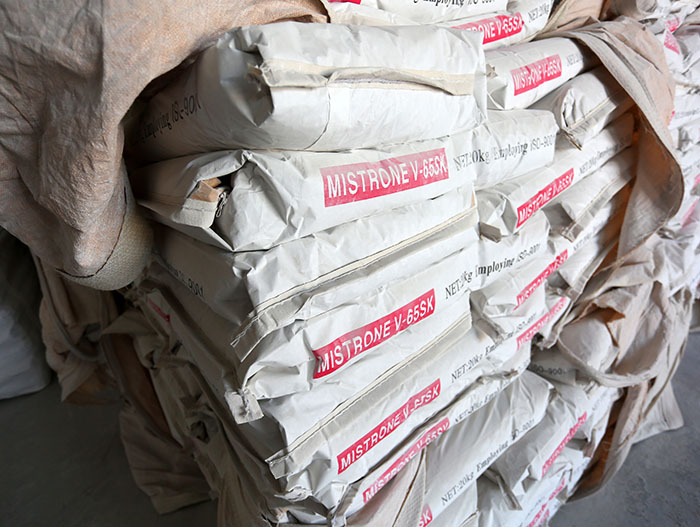Address: Zhaobao Village, Yingluo Town, Haicheng City, Liaoning Province
Phone: +86 0412-3270890
Fax:+86 0412-3270198
Email: FQKY@fqky.com
Website: www.fqky.com
Website: en.fqky.com
Mobile phone: +86 13081212999
Mobile phone: +86 15242121616
In the future, the growth of ultra-fine talc powder will still depend on the two largest end application areas: paper and ceramics, which account for about 30% of the total consumption of talc. .
In the next few years, the applications with fast growing demand are the plastics and coatings industries. Talc powder is mainly used in papermaking industry as filler, coating and resin control and deinking agent in papermaking industry. Talc is used as a filler in papermaking. It is mainly used in newsprint, coated paper, offset paper, writing paper, etc. Talc can make paper strong and white, increase opacity and brightness, and enhance the ability to absorb ink. There are three main uses of talc in the paper industry, namely as a resin control agent for fillers, coatings and pulp. Talc can make paper strong and white, increase opacity and brightness, and enhance the ability to absorb ink.
Talc has a strong fixation force on pigments, which enables color prints to obtain good color effects. The concave surface of talc has a very low abrasion value, so it has little wear on papermaking equipment and printing equipment. Furthermore, talc has a lower density than titanium dioxide (tio2) and is therefore superior as a filler to titanium dioxide. The price of talc is much lower than titanium dioxide, making it more competitive. Talcum powder has been successfully used in the deinking process of waste paper, which can effectively deink the waste paper in flotation and washing. Talcum powder can be used as a filler for roofing products such as linoleum, roofing paper, asphalt shingles, roofing boards, etc., and can also be used as an anti-sticking powder for roofing materials. When used as a filler, talc acts as a stabilizer in the molten asphalt component, increasing the stability and weathering resistance of the roofing material.

When talcum powder is sprayed on the surface of asphalt shingles or rolls of roofing material, it can prevent it from blocking during production and storage. The waterproof material industry can use low-grade colored and impure coarse ground talc. Talc has a strong fixation force on pigments, which enables color prints to obtain good color effects. Protecting the skin and mucous membranes Because talcum powder has small particles and a large total area, it can absorb a large amount of chemical irritants or poisons. Therefore, it can have a protective effect when spread on the surface of inflamed or damaged tissues; in addition to protecting the inflamed stomach The intestinal mucosa exerts antiemetic and antidiarrheal effects, and also prevents the absorption of poisons in the gastrointestinal tract.
Talc is not completely harmless. It can cause granulomas in the abdomen, rectum, and vagina. The antibacterial effect uses the plate method to make the culture medium contain 10% talc powder, which has an inhibitory effect on typhoid and paratyphoid; using a paper rule only has a mild antibacterial effect on meningococcus. Used in rubber, it can increase the volume of rubber, improve the processability of rubber, play a semi-reinforcing or reinforcing role, and adjust the hardness of rubber. Among plastics, it can increase the volume of plastics, reduce product costs, improve the dimensional stability of plastics, the hardness and rigidity of plastics, improve the heat resistance of plastics, and improve the light scattering properties of plastics.

Address: Zhaobao Village, Yingluo Town, Haicheng City, Liaoning Province
Phone: +86 0412-3270890
Fax: +86 0412-3270198
Email: FQKY@fqky.com
Mobile: +86 130-8121-2999 +86 152-4212-1616
